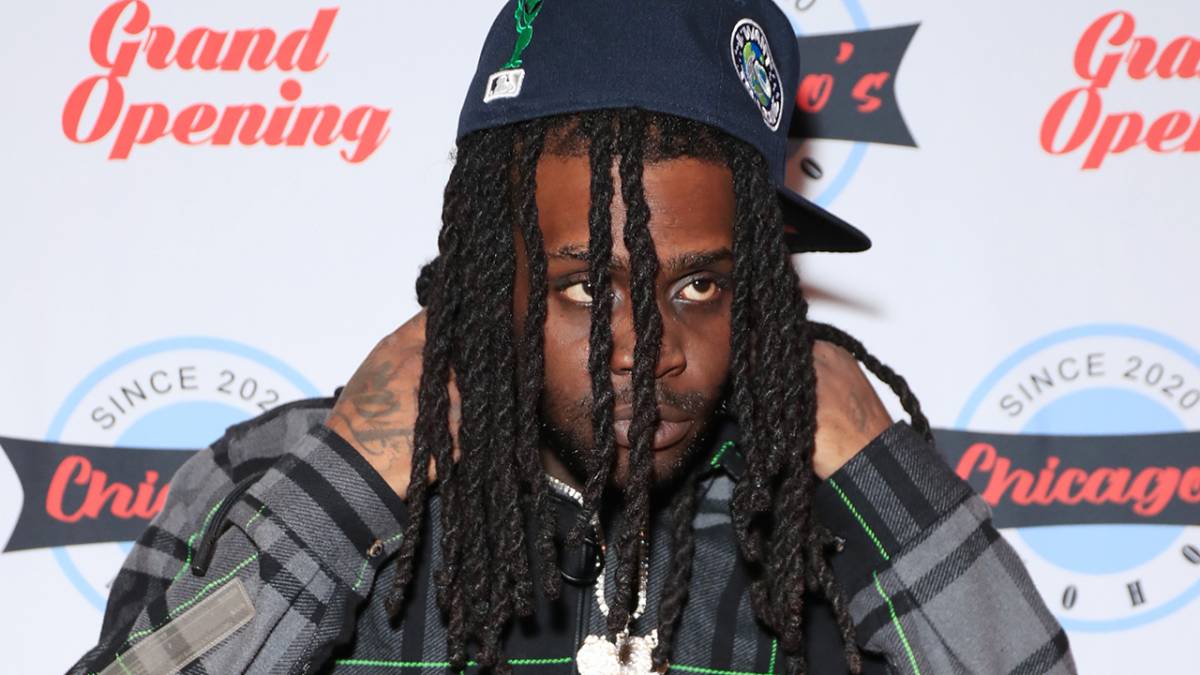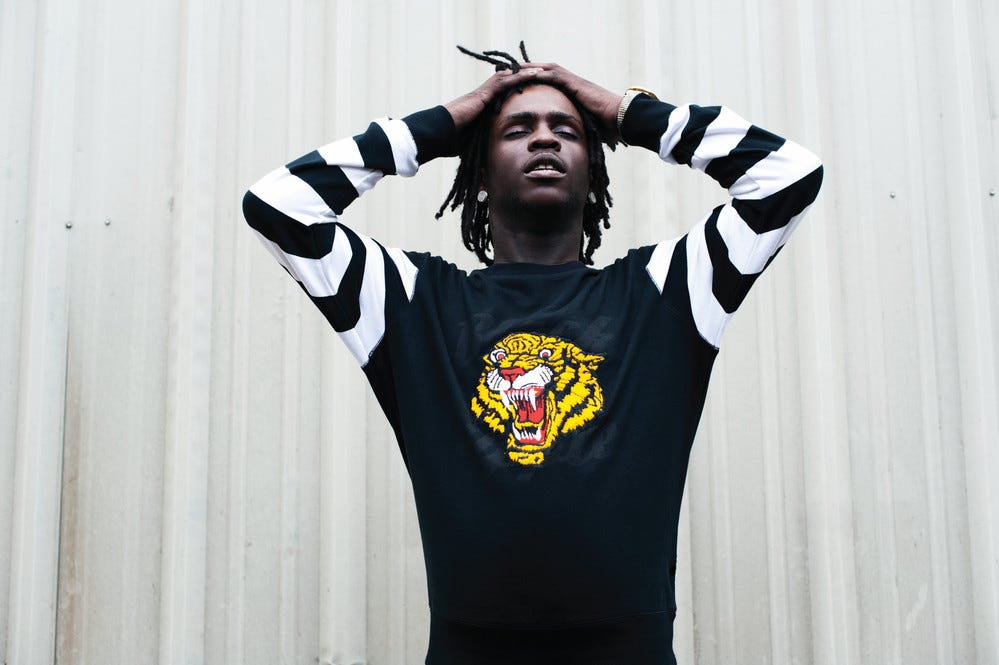SUMMARY:
- Born on August 15, 1995, Chief Keef, real name Keith Farrelle Cozart, is a 28-year-old Chicago rapper with a 2024 net worth of $1 million, known for pioneering drill music.
- His earnings come from music sales, performances, and his label, Glo Gang, showcasing his adaptability in the music industry.
- Despite legal challenges, Keef’s role as a father and musician continues to define his life, highlighting his growth beyond financial success.
Keith Farrelle Cozart, known by his stage name Chief Keef, has become an emblematic figure in the music industry, particularly within the realm of rap.
At the age of 28, Chief Keef’s influence stretches far beyond his Chicago roots, marking him as a pivotal figure in shaping the sound and direction of modern hip-hop. Born on August 15, 1995, in Chicago, Illinois, Keef’s early life was steeped in the challenges and complexities of his environment, which he adeptly channeled into his music.
Gaining fame with his hit “I Don’t Like” in the early 2010s, his raw, unapologetic style quickly garnered attention, propelling him to national acclaim. Today, Chief Keef’s net worth in 2024 stands at an impressive $1 million, a testament to his enduring relevance and impact in the music industry. His journey from a troubled youth in Chicago’s south side to a successful rapper and record producer highlights not only his musical talents but also his savvy business acumen.
Despite facing legal and personal challenges, Chief Keef has managed to maintain his status as a significant influencer in rap, contributing to the genre both through his music and his mentorship of younger artists.
Who Is Chief Keef?
Keith Farrelle Cozart, widely recognized by his stage name Chief Keef, is an influential American rapper, singer, songwriter, and record producer.
Born on August 15, 1995, in Chicago, Illinois, Chief Keef has played a pivotal role in popularizing the drill music genre, which is known for its dark, gritty lyrical content and trap-influenced beats.
Drill music, originating from Chicago, reflects the city’s street life and hardships, with Chief Keef emerging as one of its most prominent figures.
Timeline of Chief Keef’s Life So Far
- August 15, 1995: Born in Chicago, Illinois, to a young mother, Chief Keef was raised in the Englewood neighborhood, where he was exposed to the city’s violent reality from an early age.
- Early 2010s: Begins his music career by posting tracks online, quickly gaining local attention through his raw and authentic portrayal of life in Chicago.
- 2012: Achieves breakout success with the hit single “I Don’t Like,” which grabs the attention of Kanye West, leading to a high-profile remix that propels Chief Keef into the national spotlight.
- December 2012: Releases his debut album, “Finally Rich,” featuring hits such as “Love Sosa” and “Hate Bein’ Sober,” solidifying his position in the music industry.
- 2013-Present: Continues to release music while facing various legal issues and controversies, including gun charges and house arrests, which have at times overshadowed his musical achievements.
- 2014-Onwards: Expands his influence beyond music into fashion and social media, maintaining a significant following and impacting youth culture.
- 2024: As of the current year, Chief Keef remains a key figure in the hip-hop scene, known for his pioneering role in drill music and his impact on subsequent generations of artists.
Chief Keef’s journey from the streets of Chicago to becoming a central figure in the drill music scene and a cultural icon is marked by his raw lyrical talent, resilience, and complex persona.
Despite facing numerous challenges, including legal issues and controversies, his music continues to resonate with fans worldwide, making him a lasting influence in the rap genre and beyond.
What Is Chief Keef’s Net Worth In 2024?
As of 2024, Chief Keef’s net worth is estimated to be around $1 million. This figure is a reflection of his career as a pioneering figure in the drill music scene, his album sales, digital streaming revenue, live performances, and various business ventures outside of music.
Despite facing legal issues and controversies that have occasionally hindered his career trajectory, Chief Keef has managed to maintain a significant influence in the music industry and beyond.
Chief Keef’s financial standing is not just tied to his music sales but also involves earnings from his presence on social media, where he commands a large following, and his ventures into fashion and merchandise, which have contributed to his brand’s value.
Furthermore, his impact on the music industry—especially in popularizing drill music—continues to solidify his status as an influential artist, which indirectly influences his net worth through collaborations and production opportunities.
A Glimpse into Chief Keef’s Early Life and Background
Chief Keef, born Keith Farrelle Cozart on August 15, 1995, in Chicago, Illinois, grew up in the Englewood neighborhood, one of the city’s most notorious areas for violence and poverty. From a young age, Keef was immersed in an environment that would later heavily influence his music and artistic expression.
Raised primarily by his grandmother, due to his mother’s young age at the time of his birth, Keef faced the challenges of his surroundings head-on, using music as both an escape and a form of self-expression.
His early exposure to the harsh realities of street life in Chicago is reflected in the gritty, raw authenticity of his lyrics, which resonate with those who share similar experiences. Despite—or perhaps because of—these challenges, Chief Keef’s passion for music emerged early.
He started rapping at a young age, utilizing rudimentary recording equipment to capture the essence of his life and the lives of those around him, laying the groundwork for what would become a pioneering career in drill music.
Albums and Singles: Building a Musical Legacy
Chief Keef’s influence on the music industry, particularly within the drill music genre, is undeniable. His discography is a testament to his role as a pioneer, with numerous albums and singles that have not only charted but also left a lasting impact on his listeners and fellow artists.
Below is a highlight of some of Chief Keef’s most notable works that have contributed to building his musical legacy:
Albums:
- Finally Rich (2012): This debut studio album features hits like “I Don’t Like,” “Love Sosa,” and “Hate Bein’ Sober,” which played significant roles in catapulting drill music into mainstream consciousness.
- Bang 3 (2015): As one of his follow-up projects, this album showcases Chief Keef’s evolving sound and continued influence in the drill music scene.
- Dedication (2017): This project is noted for its introspective tracks and demonstrates Chief Keef’s versatility as an artist.
Singles and Notable Tracks:
- “I Don’t Like” (feat. Lil Reese) (2012): A defining track in Chief Keef’s career, its remix by Kanye West brought it to a wider audience.
- “Love Sosa” (2012): Another standout track from Finally Rich, it has become a drill anthem and remains one of Chief Keef’s most popular songs.
- “Faneto” (2014): A single that gained a cult following for its energetic delivery and became an anthem at parties and concerts.
- “Earned It” (2015): Showcasing his production skills, this track highlights Chief Keef’s versatility and ability to create catchy melodies.
Chief Keef’s contributions extend beyond these highlighted works, with a prolific output that includes numerous mixtapes, singles, and collaborations with other artists. His ability to consistently produce music that resonates with fans while staying true to his roots has solidified his place in the industry.
Through his albums and singles, Chief Keef has not just built a musical legacy; he has influenced a generation of artists and helped shape the sound of modern hip-hop.
Analyzing Chief Keef’s Influence on Music and Culture
Chief Keef’s emergence in the early 2010s marked a significant turning point in hip-hop, particularly through his role in popularizing drill music.
His raw, unfiltered narratives about life in Chicago’s South Side resonated with many, offering a stark, unapologetic glimpse into the realities of street life. This authenticity, combined with his unique sound and style, helped forge a new path for hip-hop, influencing both the genre’s musical direction and its cultural impact.
Beyond the beats and lyrics, Chief Keef’s influence extends into the broader cultural landscape. His use of social media to promote his music revolutionized how artists connect with audiences, setting a precedent for emerging musicians.
His impact is also visible in fashion, where his distinctive style contributed to the streetwear trends that dominate the industry today.
Chief Keef’s legacy is multifaceted, shaping not only the sound of modern hip-hop but also influencing the genre’s aesthetics and the way music is shared and discovered. Through his contributions, he has left an indelible mark on music and culture, illustrating the powerful role of art in reflecting and shaping the world around us.
A Peek into the Personal Life of Chief Keef
Chief Keef, born Keith Farrelle Cozart on August 15, 1995, has had a life that’s as complex and intriguing as his music.
From his early beginnings in Chicago’s Englewood neighborhood to becoming a central figure in the drill music scene, his personal journey has been marked by both challenges and milestones.
At the tender age of 16, Chief Keef became a father to his first child, a daughter named Kayden Kash Cozart, affectionately nicknamed “Kay Kay.” This event marked the beginning of his journey into fatherhood at a young age, a role that he has since embraced multiple times over. According to various sources, including Wikipedia and The Famous People, Chief Keef has fathered several children with different partners, although the exact number and all of their names are not widely publicized.
This aspect of his life has remained relatively private, with Chief Keef only occasionally sharing glimpses into his family life through social media.
Chief Keef’s relationships and experiences as a father have undoubtedly influenced his music and public persona. Despite his controversies and legal issues, these experiences have also shown a different side to the rapper, highlighting his responsibilities and growth as a parent.
The rapper’s upbringing and early exposure to Chicago’s street life have been pivotal in shaping his music. Raised primarily by his grandmother, Chief Keef’s family background and personal struggles have been a driving force behind his authentic and gritty lyrical content. His music not only reflects his own experiences but also serves as a voice for others who have faced similar challenges.
Throughout his career, Chief Keef has managed to keep much of his personal life away from the limelight, including details about his parents and romantic relationships. However, it’s clear that family and close relationships play a significant role in his life, influencing both his character and his creative output.
Conclusion
Chief Keef’s journey from the streets of Chicago to becoming a millionaire rapper and influential figure in the music industry is nothing short of remarkable.
With a net worth of $1 million by 2024, his story is a testament to the power of resilience, talent, and the ability to evolve amidst adversity. Beyond the numbers, Chief Keef’s legacy is intricately tied to the evolution of drill music and his role in bringing the genre to a global audience. His impact extends beyond his financial success, influencing a generation of artists and shaping the sound of contemporary hip-hop. As Chief Keef continues to navigate his career and personal life, his net worth is just one aspect of his multifaceted contributions to music and culture.
His story serves as an inspiration to many, proving that with determination and creativity, it’s possible to overcome even the toughest of beginnings to achieve greatness!








